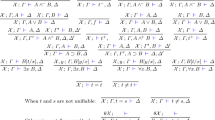Abstract
We consider the difficulty of reasoning about schematic programs. The general framework is taken to be that of propositional dynamic logic (PDL), which is a natural extension of the propositional calculus, subsuming Hoare logic and various modal logics. Formulas in PDL can express a wide spectrum of statements about propositional programs, including correctness, termination and equivalence. One of the main interests in PDL stems from allowing the particular class of programs to vary. Examples include regular (iterative) programs, flowcharts, context-free (recursive) procedures, and concurrent versions thereof. As it turns out, the difficulty of deciding satisfiability of formulas in such logics can range from being NP-complete to being highly-undecidable.
The paper surveys and puts into perspective work carried out by many people over the last 16 years.
Preview
Unable to display preview. Download preview PDF.
Similar content being viewed by others
References
K. Abrahamson, Decidability and Expressiveness of Logics of Programs, Ph.D. thesis, Technical Report 80–08–01, Univ. of Washington, Seattle, 1980.
A.K. Chandra, D. Kozen and L. J. Stockmeyer, “Alternation”, J. Assoc. Comput. Mach. 28 (1981), 114–133
D. Drusinsky and D. Harel, “On the Power of Bounded Concurrency I: Finite Automata”, submitted. (Preliminary version appeared as “On the Power of Cooperative Concurrency”, Proc. Concurrency ‘88,Lecture Notes in Computer Science, Vol. 335, Springer-Verlag, New York, 1988, pp. 74–103.)
A. Ehrenfeucht and P. Zeiger, “Complexity measures for regular expressions”, J. Comp. Sys. Sci. 12 (1976), 134–146.
M. J. Fischer and R. E. Ladner, “Propositional Dynamic Logic of Regular Programs”, J. Comput. Sys. Sci. 18 (1979), 194–211.
J. Y. Halpern and J. H. Reif, “The Propositional Dynamic Logic of Deterministic Well-Structured Programs”, Theor. Comput. Sci. 27 (1983), 127–165.
GH] N. Globerman and D. Harel, “Succinctness Results for Multi-Pebble Automata”, in preparation.
D. Harel, “Dynamic Logic”, in Handbook of Philosophical Logic Vol.II, Reidel, Dordrecht, pp. 497–603, 1983.
D. Harel, “Recurring Dominoes: Making the Highly Undecidable Highly Understandable”, Ann. Disc. Math. 24 (1985) 51–72.
D. Harel, “Effective Transformations on Infinite Trees, with Applications to High Undecidability, Dominoes and Fairness”, J. Assoc. Comput. Mach. 33 (1986), 224–248.
D. Harel and M. S. Paterson, “Undecidability of PDL with J. Comput. Sys. Sci. 29 (1984), 359–365.
D. Harel, A. Pnueli, and J. Stavi, “Propositional Dynamic Logic of Nonregular Programs”, J. Comput. Sys. Sci. 26 (1983), 222–243.
D. Harel and D. Raz, “Deciding Properties of Nonregular Programs”, SIAM J. Comput.,to appear. (Preliminary version appeared in Proc. 31st IEEE Symp. Found. Comput. Sci.,IEEE Press, New York, pp. 652–661, 1990.)
HR2] D. Harel and D. Raz, “Deciding Emptiness for Stack Automata on Infinite Trees”, Inf. and Comput.,to appear.
D.Harel, R. Rosner and M. Vardi, “On the Power of Bounded Concurrency III: Reasoning about Programs”, Proc. 5th Symp. on Logic in Computer Science, IEEE Press, New York, pp. 479–488, 1990.
D. Harel and R. Sherman, “Propositional Dynamic Logic of Flowcharts”, Inf. and Cont. 64 (1985), 119–135.
M. A. Harrison, Introduction to Formal Language Theory, Addison-Wesley, Reading, MA, 1978.
C.A.R. Hoare, “Communicating Sequential Processes”, Comm. Assoc. Comput. Mach. 21 (1978), 666–677.
J. E. Hoperoft and J. D. Ullman, Introduction to Automata Theory, Languages, and Computation, Addison-Wesley, Reading, MA, 1979.
T. Koren and A. Pnueli, “There Exist Decidable Context-Free Propositional Dynamic Logics”, Proc. Symp. on Logics of Programs, Lecture Notes in Computer Science, Vol. 164, Springer-Verlag, New York, pp. 290–312, 1983.
D. Kozen and R. Parikh, “An Elementary Proof of the Completeness of PDL”, Theor. Comput. Sci. 14 (1982), 113–118.
D. Kozen and J. Tiuryn, “Logics of Programs”, in Handbook of Theoretical Computer Science, ( J. Van Leeuwen, ed.), Vol. B, Elsevier Science Publishers B.V., Amsterdam, 1990, pp. 789–840.
Z. Manna and A. Pnueli, The Temporal Logic of Reactive and Concurrent Systems: Specification, Springer-Verlag, New York, 1992.
A.R. Meyer and M. J. Fischer, “Economy of Description by Automata, Grammars, and Formal Systems”, Proc. 12th IEEE Symp. on Switching and Automata Theory, pp. 188–191, 1971.
A.J. Mayer and L.J. Stockmeyer, “The Complexity of Word Problems - This Time With Interleaving”, IBM Report RJ 8947, IBM Research Division, San Jose, CA, Sept. 1992; Inf. and Comput.,to appear.
MS2] A.J. Mayer and L.J. Stockmeyer, private communication.
R. Milner, A Calculus of Communicating Systems, Lecture Notes in Computer Science, Vol. 94, Springer-Verlag, New York, 1980.
R. J. Parikh, “On context-free languages”, J. Assoc. Comput. Mach. 13 (1966), 570–581.
V. R. Pratt, “Semantical Considerations on Floyd-Hoare Logic”, 17th IEEE. Symp. Found. Comput. Sci.,IEEE Press, New York, pp. 109–121, 1976.
V. R. Pratt, “A Near Optimal Method for Reasoning about Action”, J. Comput. Sys. Sci. 20 (1980), 231–254.
V.R. Pratt, “Using graphs to understand PDL”, Proc. Workshop on Logics of Programs (D.C. Kozen, ed.), Lec. Notes Comp. Sci. 131, Springer, 1981, pp. 387–396.
H. Rogers, Theory of Recursive Functions and Effective Computability, McGraw-Hill, New York, 1967.
M.O. Rabin and D. Scott, “Finite Automata and Their Decision Problems”, IBM J. Res. 3 (1959), 115–125.
M. Vardi, P. Wolper, “Automata-Theoretic Techniques for Modal Logics of Programs”, J. Comput. Sys. Sci. 32 (1986), 183–221.
Author information
Authors and Affiliations
Editor information
Editors and Affiliations
Rights and permissions
Copyright information
© 1993 Springer-Verlag Berlin Heidelberg
About this paper
Cite this paper
Harel, D. (1993). How Hard is it to Reason about Propositional Programs?. In: Broy, M. (eds) Program Design Calculi. NATO ASI Series, vol 118. Springer, Berlin, Heidelberg. https://doi.org/10.1007/978-3-662-02880-3_9
Download citation
DOI: https://doi.org/10.1007/978-3-662-02880-3_9
Publisher Name: Springer, Berlin, Heidelberg
Print ISBN: 978-3-642-08164-4
Online ISBN: 978-3-662-02880-3
eBook Packages: Springer Book Archive




